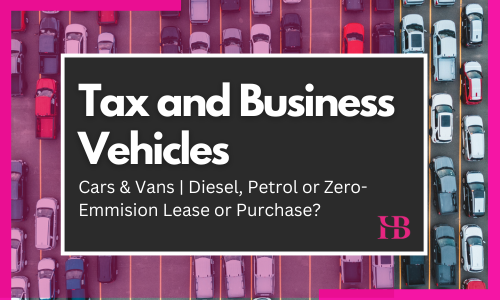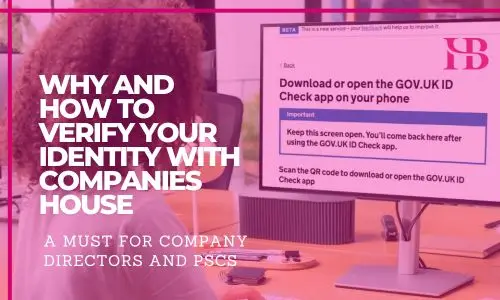Cars and vans. Diesel, petrol or zero-emission vehicles. To lease or purchase: Every decision about acquiring a business vehicle and how it is then used will have an impact on your tax bill. Here is a short overview of the current legislation but be aware, there are planned changes from April 2025, especially for electric cars, so it is important to keep abreast of what may be changing and plan accordingly.

Is it a car or is it a van?
If you own or use a vehicle through a limited company, the way it is taxed depends on whether HMRC classifies it as a van or car. Understanding how HMRC will tax your company vehicle is especially important if it’s used for private journeys as well as business ones.
Each form of taxation is applied differently. For example:
- Capital allowances can be deducted from some or all of the value of company vehicles from profits before tax, depending on whether it’s a van or car
- VAT may be reclaimed on a new company van or car, as well as fuel costs, if the vehicle is used exclusively for business purposes
- Benefits in kind are payable on the private use of a company vehicle
VAT and Cars
HMRC defines a car as being:
- any motor vehicle of a kind normally used on public roads which has three or more wheels and either:
- is constructed or adapted mainly for carrying passengers or
- has roofed accommodation to the rear of the driver’s seat that’s fitted with side windows.
VAT cannot be recovered (usually) on the purchase of a car and there are very limited exceptions. For example, if a car is bought solely for business use such as by a taxi driver or by a driving instructor, then VAT may be recovered BUT it has to be proven that the car is used exclusively for the purposes of business.
If your business leases a car, it can usually recover 50% of the VAT and reclaim VAT on business-related running and maintenance costs or on accessories fitted after purchase, so long as they have a business use.
Capital Allowances and Electric Cars
Businesses buying new electric cars or cars with zero CO2 emissions qualify for 100% first year allowances until 1 April 2025, meaning the entire expenditure can be written off against taxable income in the tax period in which incurred.
The following equipment can claim 100% first year allowances as long as it is new and unused:
- electric cars and cars with zero CO2 emissions
- plant and machinery for gas refuelling stations, for example storage tanks, pumps
- gas, biogas and hydrogen refuelling equipment
- zero-emission goods vehicles
- equipment for electric vehicle charging points
Capital Allowances and Cars
Capital allowances provide tax relief against cars and vans purchased and/or used for business purposes. However, the amount of capital allowance you can claim depends on the type of vehicle in question.
The definition of a car for capital allowances purposes is different from the VAT definition. A car is any mechanically propelled vehicle other than:
- a motorcycle
- a vehicle of a construction primarily suited to the conveyance of goods or burden of any description (ie, a goods vehicle), or
- a vehicle of a type that is not commonly used as a private vehicle and is unsuitable for use as a private vehicle
If a vehicle is a car, ‘writing down allowances’ may be claimed. This allows the deduction of a percentage of the car’s value from pre-tax profits each year, based on the vehicle’s CO2 emissions:
- 100% (first year allowance) – new and unused cars with 0g/km CO2 emissions, or
- 18% (main rate allowance) – cars with CO2 emissions up to 50g/km, or
- 6% (special rate allowance) – cars with CO2 emissions over 50g/km
More information may be found here.
VAT and Commercial Vehicles
VAT can be recovered on lorries, vans and other commercial vehicles supplied to a registered business if they are used for the purpose of the business.
Commercial vehicles are defined as:
• Vehicles capable of accommodating only one person or suitable for carrying 12 or more people including the driver
• Caravans, ambulances and prison vans
• Vehicles of not less than three tonnes unladen weight
• Special purpose vehicles, such as ice cream vans, mobile shops, hearses, bullion vans, and breakdown and recovery vehicles
• Vehicles with a payload of one tonne or more.
The vehicle must not be available for any private use, including travelling between your home and workplace unless the car is:
- a ‘stock in trade’ of a motor manufacturer or dealer
- mainly used as a taxi, driving instruction car, or self-drive hire
You can also reclaim all of the VAT on fuel if the vehicle is used exclusively for business. However, if you use the vehicle for any private journeys, you can only reclaim VAT on the fuel used for business. Alternatively, you can reclaim 100% of the VAT and pay a fuel scale charge to cover private usage.
Generally, you can reclaim VAT paid on other business-related costs like low emission zone charges (if applicable), off-street parking, repairs, and any accessories fitted for business use.
Business vehicles that are not cars, are eligible for the Annual Investment Allowance (AIA). The AIA provides a 100% deduction for the cost of plant and machinery purchased by a business up to an annual limit.
Benefits in Kind
Benefits in kind relate to tax on company benefits (e.g., cars, vans, accommodation, loans) provided to directors and employees.
If you have access to a company car for private use (including commuting), the amount of personal tax you pay on the car is based on the list price of the car and the scale of CO₂ emissions.
If fuel is provided for private use of a vehicle, or costs are reimbursed, there is an additional benefit in kind charge. This does not apply to wholly electric cars.
Benefits in Kind and Cars
The definition of a car for the purposes of benefits in kind is a mechanically propelled road vehicle that is not:
- a goods vehicle – a vehicle of a construction primarily suited for the conveyance of goods or burden (this does not include people) of any description
- a vehicle of a type not commonly used as a private vehicle and unsuitable to be so used
- a motorcycle, as defined in Section 185(1) of the Road Traffic Act 1988
- an invalid carriage, as defined in Section 185(1) of the Road Traffic Act 1988
Benefits in Kind and Electric Vehicles
Whilst employees are required to pay income tax on the use of a company car, the benefit in kind for company cars is calculated based on the car’s C02 emissions and the list price of the vehicle. The current 2024 Benefit In Kind rate is 2% for electric cars. It is set to remain at 2% for the 2024/25 tax year, after which it will increase by 1% a year each year to reach 5% in 2027/2028.
There are no fuel scale charges applied to fully electric cars as electricity is not a fuel. For reimbursement of mileage, there is an approved rate of 9p per mile. The rates are published under Advisory Fuel Rates on gov.uk and it is important to review this periodically as the rate may be changed.
There are also tax advantages if you provide your employee with charging facilities at your workplace, and even for the installation of a vehicle charging point at the employee’s home.
Benefits in Kind and Vans
For benefit in kind purposes, a van is a vehicle which is primarily constructed to carry goods or burden. Rather than paying tax in relation to the value of the vehicle and its CO₂ emissions, Benefits in Kind tax is paid on standard flat-rate values of:
- £3,500 for the use of the van, and
- £699 for the fuel (if also provided by the company)
If the van is electric, the benefit in kind rate will be £0 and there is no fuel charge.
The amount of benefit in kind tax that to pay depends on an individuals’ Income Tax rate, either 20%-45%, depending on whether they are a basic rate, higher rate, or additional rate taxpayer.
Benefits in Kind and Multi-purpose vehicles
Multi-purpose vehicles, like double cab pickups (DCPUs) also known as crew cabs, have a second row of seats behind the driver and can carry a larger number of passengers than a simple transit van.
HMRC had planned to tax DCPUs as cars for capital allowances and benefit in kind purposes from 1 July 2024 but has agreed that the VAT definition of a one tonne payload will apply for DCPUs for capital allowances and benefit in kind purposes. DCPUs with payload of less than one tonne will be considered a car whereas, DCPUs with a one tonne payload will be treated as goods vehicles.
If fuel is provided for private use of a vehicle, or costs are reimbursed, there is an additional benefit in kind charge. This does not apply to wholly electric cars.
GOOD TO KNOW – Electric Cars and low emission vehicles
The benefits for many new electric and low emission vehicles are changing after 1st April 2025 so we will be updating this blog as more information becomes available. However, for the 2024-2025 tax year, businesses and employees can benefit from the following:
- 100% first year capital allowances for businesses buying new electric cars or cars with zero CO2 emissions until 1 April 2025. The entire expenditure can be written off against taxable income in the tax period in which incurred.
- 100% first year allowances for purchase of new zero emission goods vehicles, gas refuelling stations, and electric vehicle charge-points until 2025.
- Electric vehicles do not pay Vehicle Excise Duty (VED)and hybrids pay a discounted rate until April 2025.
- Until 2025, the purchase of some low emission vehicles, such as taxis, trucks and vans, qualify for the government plug-in grant scheme, which gives a discounted purchase price on certain models.
- Employers may be able to use the government’s Workplace Charging Scheme to help towards buying and installing electric vehicle charge-points at eligible places of work: funding is available until 31 March 2025.
• Employers can provide workplace charging for electric or plug-in hybrid cars and vans used by employees without a charge to tax or NICs.
• HMRC accepts that there is no taxable benefit where employers reimburse employees for
the cost of charging company-owned, wholly electric cars, available for private use.
• The rules on optional remuneration do not apply to cars with CO2 emissions of 75g/km or less, making such cars very attractive for salary sacrifice arrangements.
HB Accountants is here to help you
There is so much information in this article about the variations in tax levies depending on what type of vehicle is purchased and how it is used. We are very happy to discuss your current fleet or future plans with you to determine the best options for your business and how this will impact your directors and employees. HB accountants is here to support your business and personal finances, and will always share information that will help with growing your business or improving your personal life.
For more information about all the ways HB goes above and beyond for you, your company and our community, contact the team at HB Accountants. We’re here to help.
The information contained above is for general guidance purposes only. Whilst every effort has been made to ensure the contents are accurate, please note that each individual has different circumstances and it is essential that you seek appropriate professional advice before you act on any of the information contained herein. HB Accountants can accept no liability for any error
Read Our Latest Blogs Below
- HB Accountants Leads Installation of Life-Saving Defibrillator in Rye House, Hoddesdon
 A potentially life-saving public access defibrillator has been installed in the Rye House area of Hoddesdon, made possible by local business HB Accountants, in partnership with local charity, Hearts for Herts, and a generous donation from Plumpton House landlord Clive Martin. HB Accountants’ fundraising had personal inspiration driving their mission.
A potentially life-saving public access defibrillator has been installed in the Rye House area of Hoddesdon, made possible by local business HB Accountants, in partnership with local charity, Hearts for Herts, and a generous donation from Plumpton House landlord Clive Martin. HB Accountants’ fundraising had personal inspiration driving their mission. - Cyberattacks – why FDs and CIOs need to collaborate
 The growing threat of cyberattacks remains for all UK businesses. It could result in Cyber Vandalism – such as the publication of a fake terror attack at UK stations thanks to an admin error that impacted National Rail, fake voices and images – known as a deepfake attack – scammed the British design firm Arup … Continue reading
The growing threat of cyberattacks remains for all UK businesses. It could result in Cyber Vandalism – such as the publication of a fake terror attack at UK stations thanks to an admin error that impacted National Rail, fake voices and images – known as a deepfake attack – scammed the British design firm Arup … Continue reading - Why and How to Verify Your Identity with Companies House – A Must for Company Directors and PSCs
 From 2024 onwards, Companies House has introduced important changes as part of the Economic Crime and Corporate Transparency Act. One of the biggest changes is the requirement for certain individuals to verify their identity to obtain a VIN number. This key step is to improve corporate transparency and tackle economic crime in the UK.
From 2024 onwards, Companies House has introduced important changes as part of the Economic Crime and Corporate Transparency Act. One of the biggest changes is the requirement for certain individuals to verify their identity to obtain a VIN number. This key step is to improve corporate transparency and tackle economic crime in the UK. - HB Accountants Launches Inspiring Work Experience Initiative Across Borough of Broxbourne and We’re Just Getting Started!
 We’re thrilled to announce that the HB Accountants Work Experience Programme has officially launched giving local students the opportunity to rotate through five different businesses over their week experiencing the workplace.
We’re thrilled to announce that the HB Accountants Work Experience Programme has officially launched giving local students the opportunity to rotate through five different businesses over their week experiencing the workplace. - Hello from Livingstone! Talking to Gertrude
 Sponsoring a university student in Zambia via the charity African Impact Foundation, has been an eye-opening experience for the HB team. Gertrude is studying for her Bachelor of Business Administration in Accounting and Finance at Chalimbana University in Zambia. She took time away from her studies to join a conference call with us and the … Continue reading
Sponsoring a university student in Zambia via the charity African Impact Foundation, has been an eye-opening experience for the HB team. Gertrude is studying for her Bachelor of Business Administration in Accounting and Finance at Chalimbana University in Zambia. She took time away from her studies to join a conference call with us and the … Continue reading

